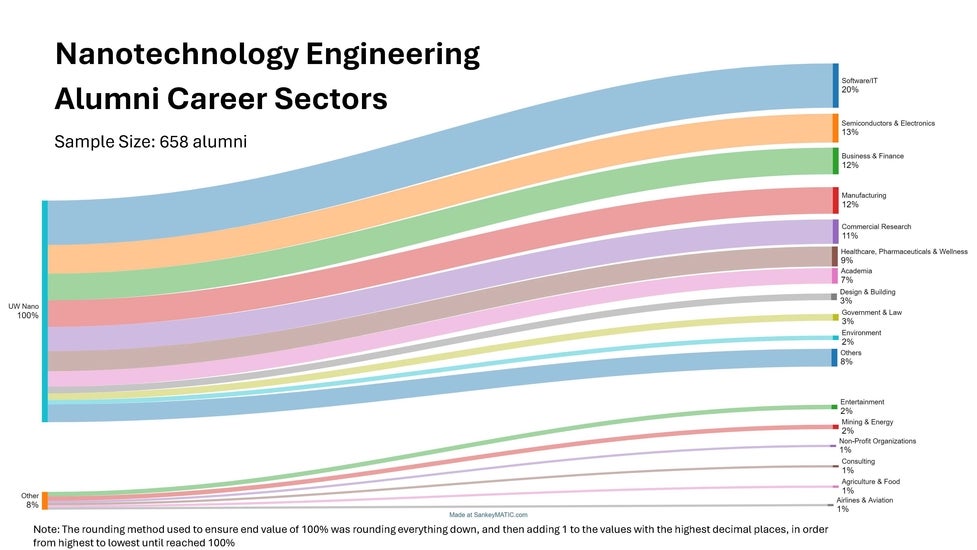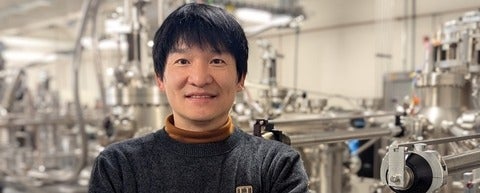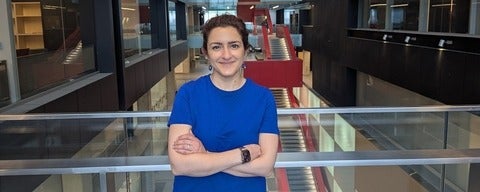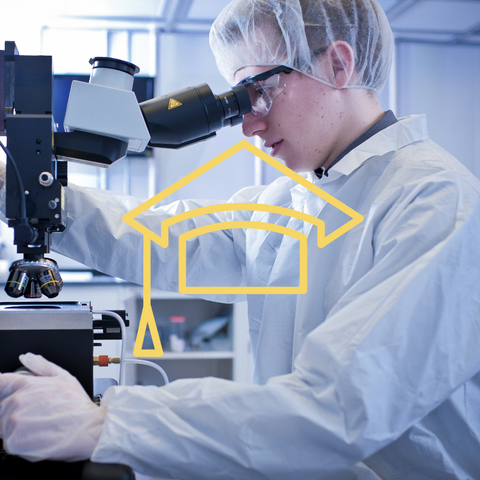Why Nanotechnology Engineering?
Nanotechnology Engineering is a multidisciplinary engineering field which combines concepts from chemical engineering, electrical engineering and chemistry. It also draws from and benefits areas such as materials science, physics, biology, quantum physics and medicine.
In Canada’s leading and first accredited Nanotechnology Engineering program, you will have a broad area of study that covers many subjects, from biology to coding. You will work with materials far too small to see with the naked eye. You will build both theoretical understanding and hands‑on experience through coursework, laboratory work, and co‑op placements. Students will work in a dedicated clean room with multimillion-dollar cutting-edge equipment for hands-on experiential learning.
Nanotechnology engineers are at the forefront of research and development related to a cluster of technologies that harnesses the unique properties and functions of nanoscale systems. Nanotechnology impacts many industries, ranging from medical to pharmaceuticals, electronics to automotive, and communications.
A specialization is available to interested students but not required. There are four specializations in the Nanotechnology Engineering program.
They are: Nanobiosystems, Nanoelectronics, Nanofabrication, and Nanomaterials.

Sample first-year courses
This is a sample schedule. Courses are subject to change.
| 1A Term | 1B Term |
|---|---|
|
MATH117 - Calculus 1 for Engineering NE100 - Introduction to Nanotechnology Engineering NE109 - Societal and Environmental Impacts of Nanotechnology NE111 - Introduction to Programming for Engineers NE112 - Linear Algebra for Nanotechnology Engineers NE121 - Chemical Principles |
MATH119 - Calculus 2 for Engineering NE110 - Introduction to Nanomaterials Health Risks NE113 - Introduction to Computational Methods NE125 - Introduction to Materials Science and Engineering NE131 - Physics for Nanotechnology Engineering NE140 - Linear Circuits |
Co-op for Nanotechnology Engineering students
Through the University of Waterloo's world-renowned co-op program, you will gain paid work experience relevant to your field of study during your degree. We'll guide you through every step of the employment process—from crafting résumés to preparing for interviews—while giving you the freedom to explore different roles and industries. It’s a practical way to discover what suits you best, strengthen your professional skills, and connect your coursework to real-world practice. Altogether, it sets you up with a meaningful edge when you graduate.
From your very first year, you’ll typically rotate between academic terms and four‑month work placements, blending classroom learning with on‑the‑job experience. You can choose to return to the same employer for multiple terms to deepen your expertise and take on more responsibility, or you can branch out and work with different organizations to broaden your perspective.
| Year | September to December (Fall) | January to April (Winter) | May to August (Spring) |
|---|---|---|---|
| First | Study | Study | Co-op |
| Second | Study | Co-op | Study |
| Third | Co-op | Co-op | Study |
| Fourth | Study | Co-op | Co-op |
| Fifth | Study | Study | - |
Your first work term will be at the end of first year. Learn more about co-op.

News
Guo-Xing Miao Director of the NE Program wins the En-Hui Yang Research and Innovation Award
Professor Guo-Xing Miao has won the En-Hui Yang Research and Innovation Award. The En-Hui Yang Award is bestowed annually to an outstanding researcher in the University of Waterloo’s Faculty of Engineering.
Miao’s research focuses on the specific spin quantum properties in condensed matter platforms. The precise confinement, transport and manipulation of electrons and ions across nano materials and devices, enriched by their accompanied spin degrees of freedom, allows for advanced information processing in both the quantum and classic realms.
His team synthesizes industrial level quantum materials such as complex spin systems, ion platforms, topological phases, and superconductors—to mass fabricate scalable, wafer-level devices.
His innovation extends to a new company called SpinQ. Miao is one of the founders and science advisors of SpinQ. This company was founded in Waterloo, with all founding members deeply connected with the Institute for Quantum Computing.
Nanotechnology Engineering professor wins two teaching excellence awards
The Nanotechnology Engineering Program is proud to announce that Professor Pendar Mahmoudi is the 2025 recipient of the Faculty Teaching Excellence Award and the Boyce Family Teaching Award.
“I feel truly honored and humbled to win these awards. Getting rewarded for a job I enjoy doing is a blessing. I am extremely thankful for the support of my colleagues in the department who will happily listen to new ideas or issues and offer assistance or advice.”
Mahmoudi’s passion for teaching emerged during her graduate studies at the University of Waterloo. She arrived at the university at just twenty-two, focused on completing her PhD.
Mahmoudi began doing teaching assistant positions during her PhD and soon realized that she enjoyed explaining concepts and helping students understand challenging material. She went on to further develop her skills through instructional courses at the Centre for Teaching Excellence.
Mahmoudi’s teaching philosophy is shaped by her own experiences as a student. She remembers what it feels like to be a student trying to figure out life and stay focused in lectures. With that in mind, she uses a variety of teaching methods.
Nanotechnology Engineering professors ranked among the world's most influential researchers
Professors Aiping Yu and Juewen Liu have been named to this year’s Highly Cited Researchers™ 2025 list recently published by Clarivate. The list highlights the world’s most influential researchers and scientists.
The exclusive list recognizes only researchers who have produced multiple Highly Cited Papers which rank in the top one per cent by citations in their field.
Professor Aiping Yu is a University Research Chair advancing next-generation energy storage by designing new nano-materials for metal-ion batteries. She uses thin, 2D materials, to make these batteries store more energy and deliver power with greater efficiency. As Director of the Applied Carbon Nanotechnology Laboratory, Yu works on improved ways to recycle batteries. Because lithium is becoming harder to obtain, her team is developing methods to recover lithium and other useful materials from old batteries.













